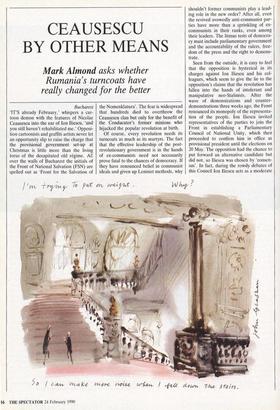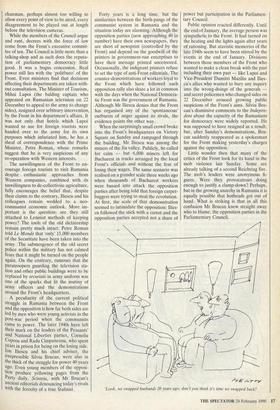CEAUSESCU BY OTHER MEANS
Mark Almond asks whether
Rumania's turncoats have really changed for the better
Bucharest `IT'S already February,' whispers a car- toon demon with the features of Nicolae Ceausescu into the ear of Ion Iliescu, 'and you still haven't rehabilitated me.' Opposi- tion cartoonists and graffiti artists never let an opportunity slip to raise the charge that the provisional government set-up at. Christmas is little more than the living torso of the decapitated old regime. All over the walls of Bucharest the initials of the Front of National Salvation (FSN) are spelled out as 'Front for the Salvation of
the Nomenklatura'. The fear is widespread that hundreds died to overthrow the Ceausescu clan but only for the benefit of the Conducator's former minions who hijacked the popular revolution at birth.
Of course, every revolution needs its turncoats as much as its martyrs. The fact that the effective leadership of the post- revolutionary government is in the hands of ex-communists need not necessarily prove fatal to the chances of democracy. If they have renounced belief in communist ideals and given up Leninist methods, why shouldn't former communists play a lead- ing role in the new order? After all, even the revived avowedly anti-communist par- ties have more than a sprinkling of ex- communists in their ranks, even among their leaders. The litmus tests of democra- cy must include parliamentary government and the accountability of the rulers, free- dom of the press and the right to demons- trate.
Seen from the outside, it is easy to feel that the opposition is hysterical in its charges against Ion Iliescu and his col- leagues, which seem to give the lie to the opposition's claims that the revolution has fallen into the hands of intolerant and manipulative neo-Stalinists. After the wave of demonstrations and counter- demonstrations three weeks ago, the Front renounced its monopoly of the representa- tion of the people. Ion Iliescu invited representatives of the parties to join the Front in establishing a Parliamentary Council of National Unity, which then proceeded to confirm him in office as provisional president until the elections on 20 May. The opposition had the chance to put forward an alternative candidate but did not, so Iliescu was chosen by 'consen- sus'. In fact, during the rowdy debates of this Council Ion Iliescu acts as a moderate
chairman, perhaps almost too willing to allow every point of view to be aired, every disagreement to be played out at length before the television cameras.
While the members of the Council argue and rant, decrees with the force of law come from the Front's executive commit- tee of ten. The Council is little more than a talking-shop and as such does the reputa- tion of parliamentary democracy little good. It was a bogus concession. Real power still lies with the 'politburo' of the Front. Even ministers find that decisions affecting their departments are taken with- out consultation. The Minister of Tourism, Mihai Lupoi (the balding captain who appeared on Rumanian television on 22 December to appeal to the army to change sides), resigned over arbitrary intervention. by the Front in his department's affairs. It was not only that hotels which Lupoi wanted to use for foreign tourists were handed over to the army for its own purposes which infuriated him, he has a sheaf of correspondence with the Prime Minister, Petre Roman, whose remarks suggest that he is very suspicious of any co-ope.ration with Western interests.
The unwillingness of the Front to en- courage foreign tourists to visit Rumania despite enthusiastic approaches from Western companies, combined with its unwillingness to de-collectivise agriculture, fully encourages the belief that, despite their claims to the contrary, Iliescu and his colleagues remain wedded to a neo- communist economic outlook. More im- portant is the question: are they still attached to Leninist methods of keeping power? The tools of the old dictatorship remain pretty much intact: Petre Roman told Le Monde that 'only' 15,000 members of the Securitate have been taken into the army. The submergence of the old secret police within the military has not calmed fears that it might be turned on the people again. On the contrary, rumours that the Paratroopers guarding the television sta- tion and other public buildings were to be replaced by securistii in army uniform was one of the sparks that lit the mutiny of army officers and the demonstrations around the Front's headquarters.
A peculiarity of the current political struggle in Rumania between the Front and the opposition is how far both sides are led by men who were young activists in the Post-war period when the communists Came to power. The later 1940s have left their mark on the leaders of the Peasants' and National Liberties parties, Corneliu Coposu and Radu Cimpaneanu, who spent Years in prison for being on the losing side. !on Iliescu and his chief adviser, the irrepressible Silviu Brucan, were also in the thick of the struggle for power 40 years ap. Even young members of the opposi- tion produce yellowing pages from the Party daily, Scinteia, with Mr Brucan's ancient editorials denouncing today's rivals With the ferocity of a true Stalinist.
Forty years is a long time, but the similarities between the birth-pangs of the communist system in Rumania and the situation today are alarming. Although the opposition parties (now approaching 40 in number) have their own newspapers, they are short of newsprint (controlled by the Front) and depend on the goodwill of the printers in government-run enterprises to have their message printed uncensored. Occasionally, the indignant printers refuse to set the type of anti-Front editorials. The counter-demonstrations of workers loyal to the Front which have followed each opposition rally also share a lot in common with the days when the National Democra- tic Front was the government of Rumania. Although Mr Iliescu denies that the Front has organised any of the 'spontaneous' outbursts of anger against its rivals, the evidence points the other way.
When the surprisingly small crowd broke into the Front's headquarters on Victory Square on Sunday and rampaged through the building, Mr Iliescu was among the miners of the Jiu valley. Publicly, he called for calm — but 6,000 miners left for Bucharest in trucks arranged by the local Front's officials and without the fear of losing their wages. The same scenario was realised on a grander scale three weeks ago when thousands of Bucharest workers were bussed into attack the opposition parties after being told that foreign carpet- baggers were trying to steal the revolution. At first, the scale of that demonstration seemed to intimidate the opposition: Ilies- cu followed the stick with a carrot and the opposition parties accepted not a share of power but participation in the Parliamen- tary Council.
Public opinion reacted differently. Until the end of January, the average person was sympathetic to the Front. It had turned on the heating and the lights again after years of rationing. But atavistic memories of the late 1940s seem to have been stirred by the events at the end of January. Divisions between those members of the Front who wanted to make a clean break with the past including their own past — like Lupoi and Vice-President Dumitri Maziliu and Hies- cu's allies who wanted to bury any inquiry into the wrong-doings of the generals — and secret policemen who changed sides on 22 December aroused growing public suspicions of the Front's aims. Silviu Bru- can's dismissive comments to the Indepen- dent about the capacity of the Rumanians for democracy were widely reported. He was supposed to have resigned as a result, but, after Sunday's demonstrations, Bru- can suddenly reappeared as a spokesman for the Front making yesterday's charges against the opposition.
Little wonder then that many of the critics of the Front look for its hand in the mob violence last Sunday. Some are already talking of a second Reichstag fire. The mob's leaders were anonymous fi- gures. Were they provocateurs doing enough to justify a clamp-down? Perhaps, but in the growing anarchy in Rumania it is equally possible that hotheads got out of hand. What is striking is that in all this confusion Mr Brucan knew straight away who to blame: the opposition parties in the Parliamentary Council.
'Look, we swapped husbands 20 years ago, don't you think it's time we swapped back?



















































 Previous page
Previous page